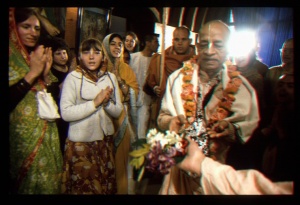SB 6.2.22

A.C. Bhaktivedanta Swami Prabhupada
TEXT 22
- dvijaḥ pāśād vinirmukto
- gata-bhīḥ prakṛtiṁ gataḥ
- vavande śirasā viṣṇoḥ
- kiṅkarān darśanotsavaḥ
SYNONYMS
dvijaḥ — the brāhmaṇa (Ajāmila); pāśāt — from the noose; vinirmuktaḥ — being released; gata-bhīḥ — freed from fear; prakṛtim gataḥ — came to his senses; vavande — offered his respectful obeisances; śirasā — by bowing his head; viṣṇoḥ — of Lord Viṣṇu; kiṅkarān — unto the servants; darśana-utsavaḥ — very pleased by seeing them.
TRANSLATION
Having been released from the nooses of Yamarāja's servants, the brāhmaṇa Ajāmila, now free from fear, came to his senses and immediately offered obeisances to the Viṣṇudūtas by bowing his head at their lotus feet. He was extremely pleased by their presence, for he had seen them save his life from the hands of the servants of Yamarāja.
PURPORT
Vaiṣṇavas are also Viṣṇudūtas because they carry out the orders of Kṛṣṇa. Lord Kṛṣṇa is very eager for all the conditioned souls rotting in this material world to surrender to Him and be saved from material pangs in this life and punishment in hellish conditions after death. A Vaiṣṇava therefore tries to bring conditioned souls to their senses. Those who are fortunate like Ajāmila are saved by the Viṣṇudūtas, or Vaiṣṇavas, and thus they return back home, back to Godhead.